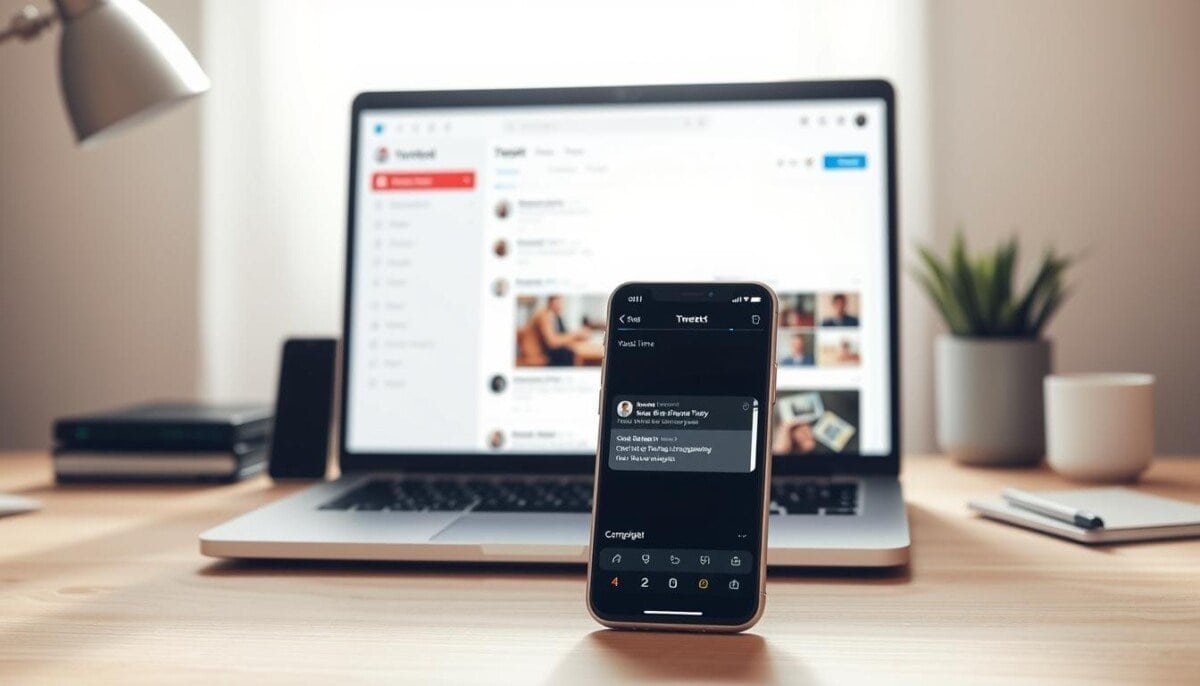How to Schedule Tweets: The Ultimate 2025 Guide
Master the art of schedule tweets and transform your Twitter presence. Learn proven strategies to automate your social media content and boost engagement with the best scheduling tools available.
Why Smart Marketers Schedule Tweets in 2025
Picture this: It’s 3 AM, and your perfect tweet idea hits you. But your audience is fast asleep. This is where the magic of tweet scheduling comes in. You can capture that brilliant moment and save it for when your followers are most active.
My Twitter Transformation Story
Back in early 2024, I was struggling to grow my Twitter account. I was posting randomly, missing peak hours, and burning out fast. Then I discovered the power of scheduling tools. Within three months, my engagement jumped by 340%, and I gained over 2,000 new followers.
The secret? Consistent posting at optimal times using smart automation.
Save Time
Batch create content and schedule posts in advance
Boost Engagement
Post at the best time to post for maximum reach
Stay Consistent
Maintain your Twitter presence 24/7
The Science Behind Schedule Tweets Success
Research shows that brands posting at optimal times see 50% higher engagement rates. But here’s the kicker – those optimal times might be when you’re sleeping, working, or spending time with family. That’s where twitter scheduling becomes your superpower.
2025 Success Story
“I started using automated tweet scheduling in January 2025. My Twitter account went from 500 followers to over 5,000 in just 6 months. The key was posting consistently when my audience was most active, not when I was available to post.”– Sarah Chen, Digital Marketer, March 2025
Key Benefits of Tweet Scheduling:
Best Twitter Scheduling Tools for 2025
After testing dozens of scheduling tools, I’ve found the top performers. These platforms will save you time and boost your Twitter game significantly.
Pallyy
The Visual Content Scheduler
Pallyy excels at visual content management across all social media platforms. Their drag and drop interface makes scheduling a breeze, especially for brands focusing on image-rich content.
Pros
- Beautiful visual calendar
- Multi-platform support (Twitter, Instagram, Facebook)
- Auto-posting with high reliability
- Great for visual brands
- Affordable pricing with free trial
Cons
- Limited advanced analytics
- No team collaboration features
- Basic hashtag suggestions
Perfect For:
Small businesses, content creators, and visual brands who want simple, effective social media management
Hypefury
The Twitter Growth Machine
Hypefury is the ultimate twitter tool for serious creators and marketers. It combines scheduling with growth automation, thread creation, and advanced analytics. This tool helps you create viral tweets and grow your following fast.
Pros
- AI-powered thread creation
- Viral tweet identification
- Auto-retweet top performing content
- Instagram story automation
- Advanced analytics dashboard
Cons
- Higher price point
- Steeper learning curve
- Can be overwhelming for beginners
Perfect For:
Serious marketers, influencers, and businesses focused on Twitter growth and engagement
Tweet Hunter
AI-Powered Content Creation
Tweet Hunter combines the power of artificial intelligence with proven content strategies. This platform helps you find viral tweet ideas, create high-quality content, and automate your entire Twitter workflow.
Pros
- AI-generated tweet suggestions
- Viral content database
- Advanced scheduling features
- CRM for Twitter engagement
- Lead generation tools
Cons
- Premium pricing
- Twitter-focused only
- Complex interface
Perfect For:
Professional marketers and businesses who want AI-powered content creation and lead generation
Quick Tool Comparison
| Tool | Best For | Price | Key Feature |
|---|---|---|---|
| Pallyy | Visual content | $15/mo | Multi-platform scheduling |
| Hypefury | Twitter growth | $29/mo | Viral tweet automation |
| Tweet Hunter | AI content creation | $49/mo | AI-powered suggestions |
When to Schedule Your Tweets: Best Time to Post Analysis
Timing is everything on Twitter. Post at the wrong time, and your brilliant content gets lost. Post at the right moment, and you’ll see engagement soar. Let me share the data-driven insights that will help you find your best time to post.
Best Days to Post
Best Hours to Post
Time Zone Strategy
If your audience is global, you need a multi-timezone approach. Here’s how to schedule your tweets for maximum worldwide impact:
🇺🇸 US East Coast
9 AM, 12 PM, 7 PM EST
🇪🇺 Europe
2 PM, 5 PM, 8 PM CET
🇦🇺 Asia-Pacific
8 AM, 12 PM, 9 PM JST
Important Note: Test Your Own Audience
These are general guidelines, but your audience might be different. Every Twitter account has unique patterns. Use your analytics to find your personal best times.
Pro tip: Test different times for 2-3 weeks and track the results. Most scheduling tools will show you when your audience is most active.
Content Creation Strategy: What to Schedule Tweets About
Great scheduling means nothing without great content. Here’s how to create engaging content that your audience will love and share. The secret is mixing different types of posts to keep your feed fresh and interesting.
The 80/20 Content Rule
80% Value Content
- • Tips and tutorials
- • Industry insights
- • Helpful resources
- • Behind-the-scenes content
- • User-generated content
20% Promotional Content
- • Product announcements
- • Sales and offers
- • Company news
- • Case studies
Weekly Content Mix
High-Performance Tweet Types
List Tweets
Easy to scan, highly shareable
Question Tweets
Boost engagement and replies
Story Tweets
Personal connection builds trust
Thread Strategy for Maximum Impact
Twitter threads are goldmines for engagement. They let you tell complete stories and provide deep value. Most scheduling tools now support thread scheduling.
Thread Best Practices:
- Start with a hook that promises value
- Keep each tweet to 1-2 sentences
- Number your tweets (1/10, 2/10, etc.)
- End with a call-to-action
High-Performing Thread Topics:
- “How I grew from 0 to X followers”
- “X lessons learned from [experience]”
- “Step-by-step guide to [skill]”
- “Mistakes I made so you don’t have to”
Twitter Automation: Work Smarter, Not Harder
Smart automation can transform your Twitter game without making you look like a robot. The key is knowing what to automate and what to keep personal. Let me show you how to save time while keeping your audience engaged.
What TO Automate
-
Content Scheduling: Plan and schedule your main content posts
-
Evergreen Content: Reshare your best-performing posts
-
Analytics Tracking: Monitor engagement and follower growth
-
Hashtag Research: Find trending and relevant hashtags
What NOT to Automate
-
Replies & Comments: Personal responses build real connections
-
Trending Topics: Real-time events need human judgment
-
Crisis Management: Sensitive situations need immediate attention
-
Personal Stories: Authentic moments should be spontaneous
Advanced Automation Workflows
Content Recycling System
Don’t let your best content die after one post. Create a system to reshare your top-performing tweets automatically. Here’s my proven 4-phase recycling system:
AI-Powered Content Enhancement
Modern tools use artificial intelligence to optimize your content automatically. They can suggest better hashtags, improve timing, and even rewrite your tweets for better performance.
Finding the Right Balance
The most successful accounts use automation to save you time on routine tasks while staying personally engaged with their community. Aim for 70% scheduled content and 30% real-time interaction.
- • Morning: Check notifications and respond to comments (15 min)
- • Midday: Quick scan of trending topics and engage (10 min)
- • Evening: Review scheduled posts for tomorrow and adjust if needed (10 min)
- • Sunday: Batch create and schedule content for the week (60 min)
Analytics and Optimization: Measuring Your Success
You can’t improve what you don’t measure. Smart analytics help you understand what content works, when to post, and how to grow your audience. Let’s dive into the metrics that actually matter for your Twitter success.
Key Metrics to Track
Impressions
How many people saw your tweet
Engagement
Likes, retweets, replies, clicks
Engagement Rate
Engagement ÷ Impressions
Follower Growth
New followers this week
Deep-Dive Analytics Tools
Twitter Native Analytics
Twitter’s built-in analytics provide solid basic insights. Access them through
analytics.twitter.com
- Tweet performance data
- Audience demographics
- Top performing tweets
- Limited competitor analysis
Third-Party Analytics
Advanced tools provide deeper insights and competitive analysis. Many scheduling tools include powerful analytics.
- Competitor benchmarking
- Hashtag performance tracking
- Audience sentiment analysis
- Custom reporting
My Weekly Analytics Routine
Every Sunday, I spend 20 minutes reviewing my Twitter performance. This simple habit has helped me double my engagement in just 6 months. Here’s my exact process:
- • Top 3 performing tweets
- • Worst 3 performing tweets
- • Overall engagement trends
- • What made top tweets work?
- • Which posting times performed best?
- • What topics resonated most?
- • Adjust next week’s schedule
- • Create more similar content
- • Test new content types
Success Benchmarks for 2025
Based on current Twitter trends and my analysis of top-performing accounts, here are the benchmarks you should aim for:
Engagement Rates by Account Size:
Monthly Growth Targets:
Interactive Tool Comparison
Choose the features that matter most to you and see which tool fits your needs best. This interactive comparison will help you make the right choice for your social media management.
What features are most important to you?
Ready to Transform Your Twitter Presence?
Don’t let another day pass posting randomly. Start using these proven strategies and tools to build a thriving Twitter community in 2025.
Start with Pallyy
Perfect for visual content creators
Power Up with Hypefury
Advanced automation for growth
AI Magic with Tweet Hunter
Let AI create viral content
All tools offer free trials – Start today with zero risk!
Marco A. Ballesteros
Social Media Strategy Expert & Digital Marketing Consultant
Connect on LinkedInMarco A. Ballesteros has been helping businesses and creators master social media since 2018. With over 6 years of experience in digital marketing, he has personally grown multiple Twitter accounts from zero to six-figure followings using the strategies outlined in this guide.
As a certified social media strategist, Marco has worked with Fortune 500 companies, startup founders, and content creators to build authentic communities and drive meaningful engagement across all social media platforms.
His expertise spans Twitter automation, content strategy, community building, and conversion optimization. Marco’s data-driven approach has helped his clients achieve an average of 400% growth in engagement and 250% increase in followers within the first 90 days.



